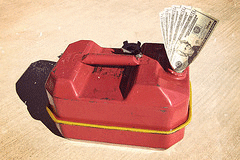
A fix is needed because the Transportation Trust Fund is in crisis, and any substantial transportation bill must come up with a new revenue answer.
But transportation advocates like Transportation Equity Network, (TEN), are hoping that the bill won't be balanced on the backs of the poor. An increase in the regressive gas tax hurts low income rural and suburban commuters disproportiately and will add to the overwhelming increase regressive taxes that the poor are experiencing.
A great new study on regressive taxes by the Institute on Taxation and Economic Policy took at look at the taxes low income people in our country are paying. Turns out that because of the terribly unfair taxing systems that states and localities have in place, those in the lowest 20 percent of incomes are paying 10.9 percent on state and local taxes while those in the top 1 percent are paying 5.4 percent.
If Congress decides to go with a gas tax, there has to be a give-back for low income people, such as the Earned Income Tax Credit (EITC) that New Jersey advocates are calling for. EITC itself should be beefed up – approximately 15-25 percent of those eligible are not receiving their money, but it is a fair system that helps millions of low income people.
We need to build this nation and address our crumbling infrastructure – but let's do it in a fair and responsible manner.
(Photo credit: Flickr user stockmonkeys, CC BY 2.0)





I understand concerns about regressive taxes, but we need to increase the gas tax substantially. It has not kept up with inflation and it is the most fair way to pay for our roads – charge the people who use them.
And let’s now forget about the threat of climate change. A gas tax will help reduce our carbon footprint and slow climate change. And we all know who has the most to lose from climate change – the planet’s poor and vulnerable.
Gas prices have dropped by nearly $1 per gallon in the past year – now is the time to raise the gas tax.
I’m fine with an increase in EITC – it is one of our legislative priorities this year – but the two do not need to be linked. The gas tax funds critical public infrastructure that low income people need as much if not more than anyone else.